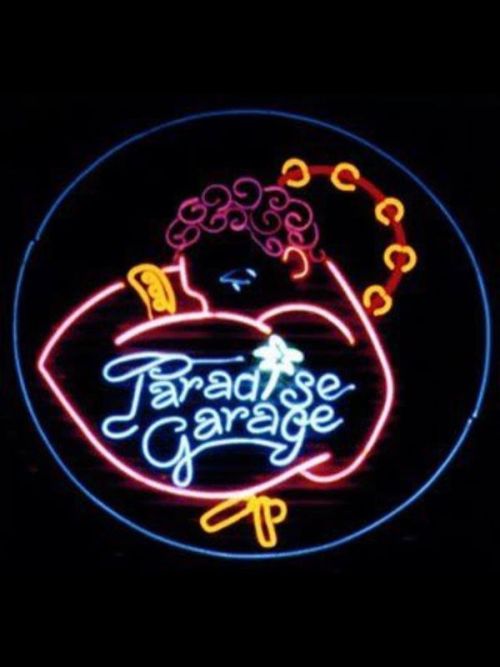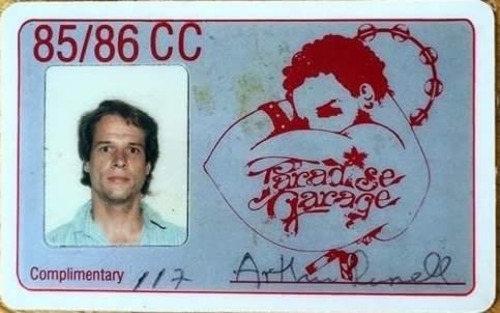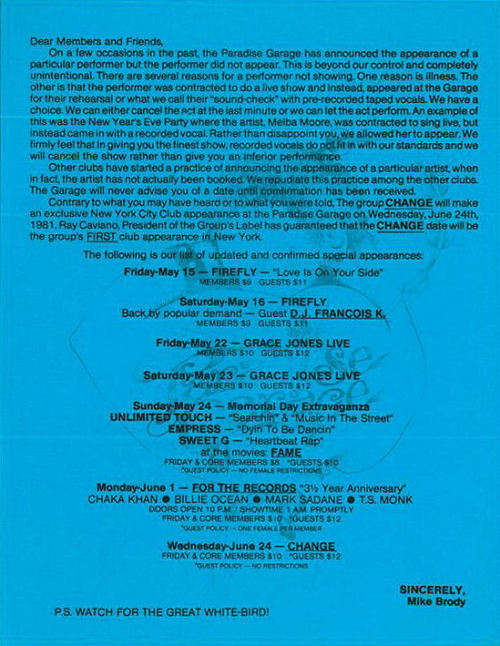#paradise garage
The Paradise Garage was a discotheque notable in the history of modern dance and pop music, as well as LGBT and nightclub cultures. Founded by Michael Brody, Paradise Garage was located at 84 King Street, in the Hudson Square neighborhood of New York City. It operated from 1977 to 1987 and was the base for resident DJ Larry Levan. The club’s name derives from its origins as a parking garage. The Paradise Garage’s business model was largely inspired by David Mancuso’s parties at The Loft: no liquor was served, there were no sales of food or beverages, and the club was not open to the general public.
The sound system was developed, designed, and installed by Richard Long of Richard Long & Associates (RLA), and was said by those who attended to be the best in New York City at that time. The club has been credited for its influence on the development of the modern dance club as it is today; unlike other clubs of its time, the Paradise Garage was focused on dancing rather than verbal interaction, and it was the first to put the DJ at the center of attention. It was known for its enthusiastic, yet unforgiving nature if a performer was struggling. Musicians who have attended include Diana Ross and a young Madonna.
In 1979, Tim Curry released the album Fearless (Tim Curry album) with the single “Paradise Garage” with lyrics about visiting this New York discotheque.
Among those to benefit from what became known as “The Garage Sound” or “Garage Music” was Mel Cheren’s own New York label West End Records. Among West End’s successes were “Sessomatto” by Sessa Matto, “Hot Shot” by Karen Young, “Heartbeat” by Taana Gardner (remixed by Levan), “Do It to the Music” by Raw Silk, and “Don’t Make Me Wait” by the Peech Boys (produced by Levan). West End Records folded for a number of years, re-opening in the late 90s and releasing one of Levan’s DJ sets recorded live at the Garage.[citation needed]
The building which housed the Paradise Garage is now a facility for Verizon Communications.[when?][citation needed] As of 2008, the Paradise Garage trademark is now owned by Gay Men’s Health Crisis (GMHC).[citation needed]
The unique and eclectic style of disco and dance music played at the Garage gave rise to the descriptive terms “New York house”, “garage”, “garage style”, and “garage classic” (to describe a record that was made famous at or is associated with the Paradise Garage). When the term “garage music” is used in reference to the Paradise Garage, it does not exclusively mean house music, although certain house tracks[which?] may be considered to be garage classics.[citation needed]
House music as a genre originated with the Garage’s house DJ Larry Levan and his contemporaries, Frankie Knuckles and Nicky Siano. These DJs played all kinds of music at the Paradise Garage so long as it was danceable - for example The Clash and The Police as well as traditional “disco” artists like Gwen Guthrie and Sylvester. Levan is remembered for his ability to seamlessly play music from different genres.[citation needed]
The term “garage” has changed meaning over time, see UK garage for a more detailed description.[citation needed] This form of music is not related to garage rock.
Post link
From the Larry Levan facebook page, a 1981 performance schedule and letter to members from the Paradise Garage.
Post link



